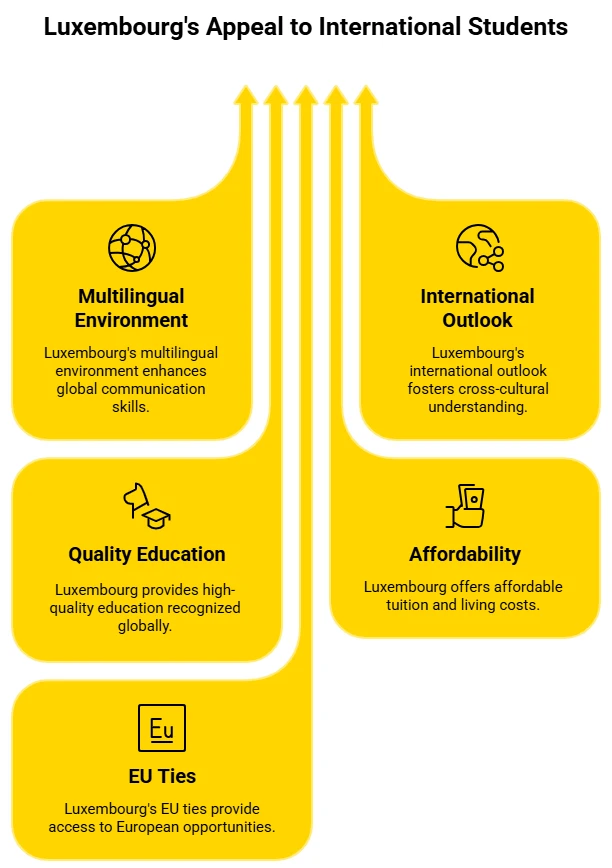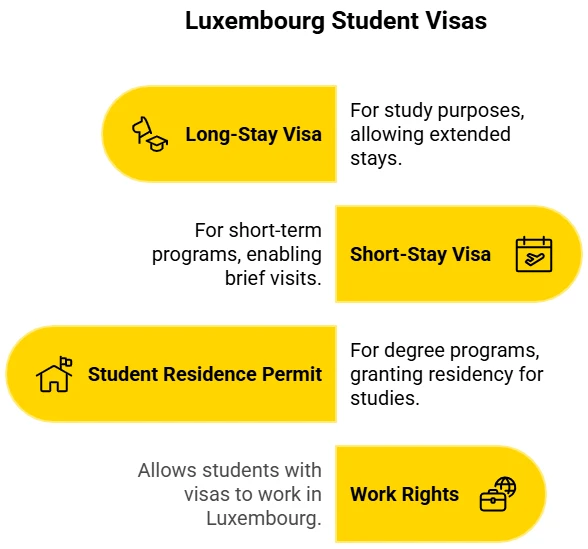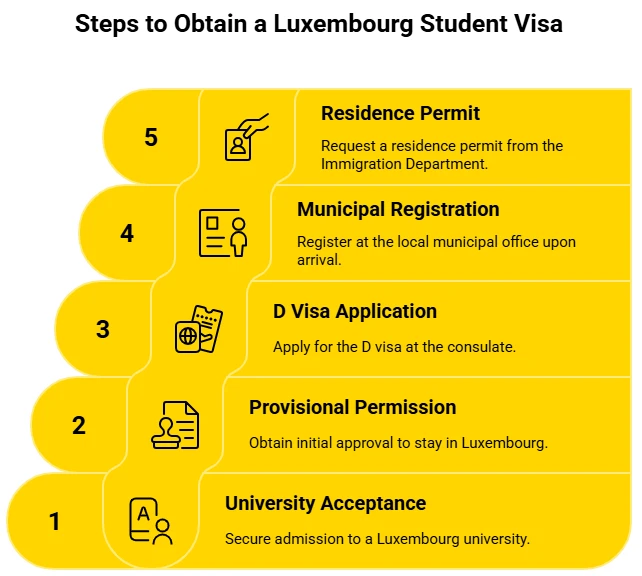Study in Luxembourg
Don't know what to do?
Get Free Counselling
Study in Luxembourg from Canada – Everything You Need to Know
Luxembourg is becoming a popular choice for students, especially Canadians, who want to study in Europe. They are drawn to its multilingual setting, international outlook, and good schools. It’s known as a safe and affordable place with ties to the EU, giving students a solid education in central Europe.
- In 2024, over 7,000 international students chose Luxembourg as their study destination. The University of Luxembourg expects this number to rise to 9,500 by 2026.
- The University of Luxembourg is within the top 250 universities worldwide, according to THE World Rankings.
- Tuition at public universities starts at just €400 per semester (around CAD 600).
- Luxembourg has three official languages: French, German, and Luxembourgish. Many courses are taught in English.
- International students can work up to 15 hours a week while studying.

*Want guidance to apply for a Luxembourg Student Visa? Sign up with Y-Axis for comprehensive support with the process.
Why Study in Luxembourg?
Luxembourg gives international students a top-notch European education in a place that values many languages and cultures, and new ideas. Because it is close to the EU and in a key spot in Europe, Luxembourg is a good pick for those wanting a great education with chances to see the world.
Students get the advantage of low-cost schooling, small classes, and programs in English at prestigious schools. The country's safety, stable government, and focus on research make it appealing to international students in fields like business, law, finance, tech, and the humanities.
Benefits of Studying in Luxembourg for Canadian Students
The benefits of studying in Luxembourg are given below.
- Quality education is accessible through small classes and current campuses.
- Tuition is cheaper than many places in Western Europe.
- The learning setting is multilingual, with English, French, and German used in higher education.
- Students can live and study in an EU center, having chances for internships and research.
- Graduates can find jobs across Europe because Luxembourg is part of the Schengen Area and EU labor market.
Types of Student Visas for Luxembourg
International students can apply for any of the Luxembourg student visas given below, depending on their requirements and purpose.
- Long-Stay Visa (D Visa) for Study Purposes
- Short-Stay Visa (C Visa) for Short-Term Programs
- Student Residence Permit for Degree Programs
- Work Rights for Students with a Luxembourg Visa

Long-Stay Visa (D Visa) for Study Purposes
International students who want to study in Luxembourg for longer than 90 days need a Long-Stay Visa (Type D). This visa lets you enter Luxembourg to study full-time at an approved school. It's the initial step; you'll also need to get a student residence permit once you're in Luxembourg.
Before you apply for the D visa, you have to get temporary permission to stay from the Luxembourg Immigration Directorate. After they approve it, you can submit your visa application to the closest consulate or embassy. The D visa usually lasts for 90 days. During that time, you need to enter Luxembourg and apply for your residence card.
Short-Stay Visa (C Visa) for Short-Term Programs
A Short-Stay Visa (Type C) lets people from outside the EU enter Luxembourg for stays of up to 90 days within a 180-day window. This visa is often used for short academic activities like language courses, summer programs, workshops, or exchange visits.
Canadians do not need a C visa for stays under 90 days because Canada is part of the Schengen visa waiver program. Even without a visa, Canadian students must have proof of enrollment, housing, enough money, and valid health insurance that covers their entire time in Luxembourg.
Student Residence Permit for Degree Programs
International students intending to study full-time in Luxembourg for more than 90 days need a Student Residence Permit. After getting a Long-Stay Visa (D Visa) and entering Luxembourg, students have 90 days to apply for this permit through the Immigration Directorate of the Ministry of Foreign and European Affairs.
To get the permit, students must register with their local commune and complete a medical exam. They also need to turn in documents that prove enrollment, housing, financial support, and health insurance. The residence permit usually lasts for one academic year and can be renewed as long as the student is making satisfactory academic progress.
Work Rights for Students with a Luxembourg Visa
In Luxembourg, international students with a valid study residence permit can work part-time, up to 15 hours a week, during the school year. They can work full-time during university holidays as long as their residence permit is still valid.
A written work contract is needed for any job, and employers must report the job to ADEM. Students with a study residence permit cannot be self-employed. These work rights help students with living expenses, but they should not be seen as a replacement for their main financial support. Students must keep up with their studies to maintain their legal status.
Eligibility Criteria for Luxembourg Student Visa
The eligibility criteria to apply for a Luxembourg Student Visa are given below.
- A letter of acceptance from a recognized university or institution in Luxembourg is needed.
- You must prove you have sufficient funds to live in Luxembourg (about €1,115 each month or €13,380 each year, CAD 19,500).
- You must be able to speak the language used for teaching at the school (English, French, or German).
- Proof of health insurance that is accepted in Luxembourg is needed.
- Your Canadian passport must be valid for longer than you plan to stay.
- If required, include a no-criminal-record certificate and a medical certificate with your visa application.
Requirements to Apply for a Luxembourg Student Visa
The documents required to apply for a Luxembourg Student Visa are given below.
- A completed application form.
- A valid Canadian passport with blank pages, plus recent photos that meet passport requirements.
- An acceptance letter from a school in Luxembourg.
- Proof you have enough money to support yourself like a bank statement, or a letter from a sponsor.
- Proof of where you plan to live in Luxembourg.
- A health insurance certificate that covers your entire stay.
- A police certificate. If it's not in an official language, you'll need to get it translated.
- A medical certificate issued within the past three months.
- Payment for the visa application fee (around €50 or CAD 70).
How to Apply for a Luxembourg Student Visa from Canada?
The process to apply for a Luxembourg Student Visa is given below.
Step 1: Gain acceptance into a Luxembourg university or higher education institution.
Step 2: Seek provisional permission to stay via the Immigration Directorate.
Step 3: With approval secured, seek a D visa at the Luxembourg consulate in Canada or the closest Schengen representation.
Step 4: Travel to Luxembourg and register at the local municipal office no more than three days after you arrive.
Step 5: Request a residence permit from the Immigration Department within three months of arrival.

Cost of Studying in Luxembourg for Canadian Students
Detailed information about the cost of studying in Luxembourg is given below.
| Category | Estimated Cost (EUR) | Expenses in CAD |
| Tuition Fees (Public Univ.) | €400 – €800 per semester | CAD 600 – CAD 1,150 |
| Living Expenses | €1,000 – €1,300/month | CAD 1,400 – CAD 1,800 |
| Visa Application Fee | €50 (one-time) | CAD 70 |
| Residence Permit Fee | €80 – €100 (depending on stay) | CAD 115 – CAD 145 |
| Health Insurance | €30 – €70/month | CAD 45 – CAD 100 |
The estimated annual cost ranges from CAD 21,000 to CAD 28,000, varying with personal habits and academic program selection.
Luxembourg Student Visa Processing Time for Canadians
Detailed information about the processing time for a Luxembourg Student Visa is given below.
| Visa Stage | Estimated Timeframe |
| Temporary authorization to stay (pre-visa) | 6 – 12 weeks |
| D Visa issuance at consulate | 2 – 4 weeks after approval |
| Residence permit processing in Luxembourg | 1 – 3 weeks after arrival |
Scholarships and Financial Aid for Canadians Studying in Luxembourg
Students from Canada intending to study in Luxembourg can apply for the scholarships given below.
| Scholarship Name | Details |
| University of Luxembourg Scholarships | Merit-based and needs-based scholarships available for non-EU students. |
| Luxembourg Ministry of Higher Education Aid | Public aid available for students enrolled in recognized programs. |
| Erasmus+ Grants | Available for short-term mobility or exchange programs within Europe. |
| Canada’s Global Skills Opportunity | Canadian-funded mobility grants for eligible students going abroad. |
| Research Grants (Doctoral/Postdoc) | Offered via university and EU-funded projects in science and innovation. |
Post-Study Options for Canadian Graduates in Luxembourg
In Luxembourg, graduates of recognized higher education programs can apply to extend their temporary residence permit, typically for a year, to find a job or start a company. This lets them stay in Luxembourg and switch to a work or professional residence permit once they get a job that fits their skills.
Luxembourg’s job market, which uses many languages and includes people from many countries, has special chances for qualified international graduates from Canada and other countries outside the EU, especially in areas like finance, law, tech, and European groups.
How Can Y-Axis Help You?
Y-Axis is a leading study abroad consultancy in Canada. We provide international education advice, helping students from Canada explore study options and gain admission to universities across the globe. We have specific knowledge of European schools and offer complete support to make studying in Luxembourg easier.
We can help you by:
- Providing one-on-one advice for choosing a university and program
- Helping with student visa applications and paperwork
- Supporting the preparation of financial and educational documents
- Offering pre-departure advice and finding a place to live
- Advising on options after graduation in Europe
Frequently Asked Questions
